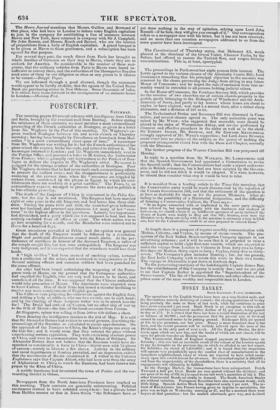The proceedings in Parliament last night possess little interest. The
Lords agreed to the various clauses of the Admiralty Courts Bill; Lord Buounuam remarking that his principal objection to the measure was removed by the clause preventing the Judge from sitting in any future House of Commons ; and he hoped the rule of exclusion from that as- sembly would be extended to all persons holding judicial offices.
In the House of Commons, the Farnham Rectory Bill, which provides for the erection of two churches out of certain church-property in the parish, partly belonging to the Bishopric of Winchester and the Arch- deaconry of Sorry, and partly to lay lessees whose leases are about to expire or have expired, was read a a second time, after a rather sharp discussion, and a division of 187 to 61.
The Ecclesiastical Duties and Revenues Bill was discussed in Com- mittee, and several clauses agreed to. The only noticeable point was raised by Mr. Wrens ; who suggested that moveable seats should be placed in the aisles of Westminster Abbey, and service performed by eloquent and effective preachers in the aisles as well as in the choir. Sir Romer Iscus, Mr. BRISCOE, and Sir EDWAltD KNATCHRULL strongly approved of Mr. Wynn's suggestion ; but Lord JOHN RUSSELL could enter into no pledge on the subject, as the power of making the proposed arrangement rested first with the Dean and Chupter, secondly with the Diocesan.
The further progress of the Weaver Churches Bill was postponed till Monday.
In reply to a question from Mr. WALLACE, Mr. LABOUCHERE said that the Spanish Government had appointed a Commission to revise the Spanish tariff; that the Commissioners had made a report unfavour- able to British commerce, but it had not been adopted by the Govern- ment, and he did not think it would be adopted. If it were, however, he should then consider what step it would be best to take.


























 Previous page
Previous page